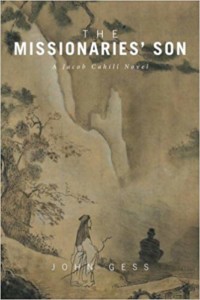 Title: The Missionaries’ Son: A Jacob Cahill Novel
Title: The Missionaries’ Son: A Jacob Cahill Novel
Author: John Gess
Publisher: Xlibris
ISBN: 978-1-5245-4275-7
Pages: 255
Genre: Fiction
Reviewed by: Dan Macintosh
Pacific Book Review
John Gess’ novel, about an unusually bright young man, is fascinating from many different angles. It centers around Jacob Cahill, the missionaries’ son, but Cahill is more than just the lone child of two missionaries to China. He is also wise beyond his years, which is a trait ultimately necessary for his very survival. Gess is a gifted storyteller, and The Missionaries’ Son is truly one of those books that will keep you on the edge of your seat with every page.
This book begins, innocently enough, with the story of two dedicated missionaries in China. Gess introduces us to their calling, as well as their internal struggles to start a family. They do eventually have a family, a son they name Jacob. Everybody recognizes Jacob’s innate intelligence, even at a young age. He’s inquisitive, polite and always helpful, which makes him likeable within his small Chinese village home.
Although the Cahill family must struggle as square peg Americans fitting into a foreign Chinese culture, this is something they’re able to do because – like their son – they have servant hearts. However, Gess sets his story in the mid-20thcentury, during the rise of communism in China. And it’s not long before the Chinese government clamps down on their village’s regular way of life. Tragically, in addition to redistributing land and wealth – which is a universal communist practice – these changes take a deadly toll on the Cahills and those close to them.
What begins as a rather innocent story about missionary life in China, is suddenly transformed into a nervy series of escape stories. This begins when Jacob’s mom, Rachel, becomes pregnant with him and escapes home to give birth. She is accompanied by Mu Ju, her husband’s surrogate mother, and later Jacob’s surrogate grandmother. But this won’t be the last escape scene; Jacob himself would one day need to apply his innate intelligence to his own flight for freedom.
Gess does a fine job of giving keen insight into the world politics of this story’s setting, without letting this essential information interfere with exciting storytelling. Had he focused too much on sharing his obvious knowledge about China during the mid-20thcentury, this likely would have bogged down the action. Conversely, had he not provided the proper context, none of the action scenes would have made sense, nor would the drama have been quite as palpable. It’s a difficult balancing act, but Gess gets the balance perfect throughout.
It’s also heartening to see how respectfully Gess treats religion. While the Cahills are Christian missionaries, son Jacob is forced to hide out with a group of Buddhist monks at one point. These belief systems are quite different, however Gess never tries to push one over the other on the reader. Instead of attempting to show fault in one or the other, the reader mainly only sees the positive attributes in each.
Gess spent much of his youth in military bases, where he becomes interested in military history. Knowing this bit about Gess’ background makes it easy to understand how the author was able to detail this pivotal era in Chinese history. Although he doesn’t come off as one with an ax to grind, the grim picture Gess paints of China’s evolution into communism is not at all positive. One gets the undeniable sense that Gess doesn’t approve of this transformation that so adversely affected the lives of so many innocent people.
Whether you’re a history buff, like Gess, or just someone that appreciates an exciting story, The Missionaries’ Son: A Jacob Cahill Novel is one extremely difficult book to put down.

